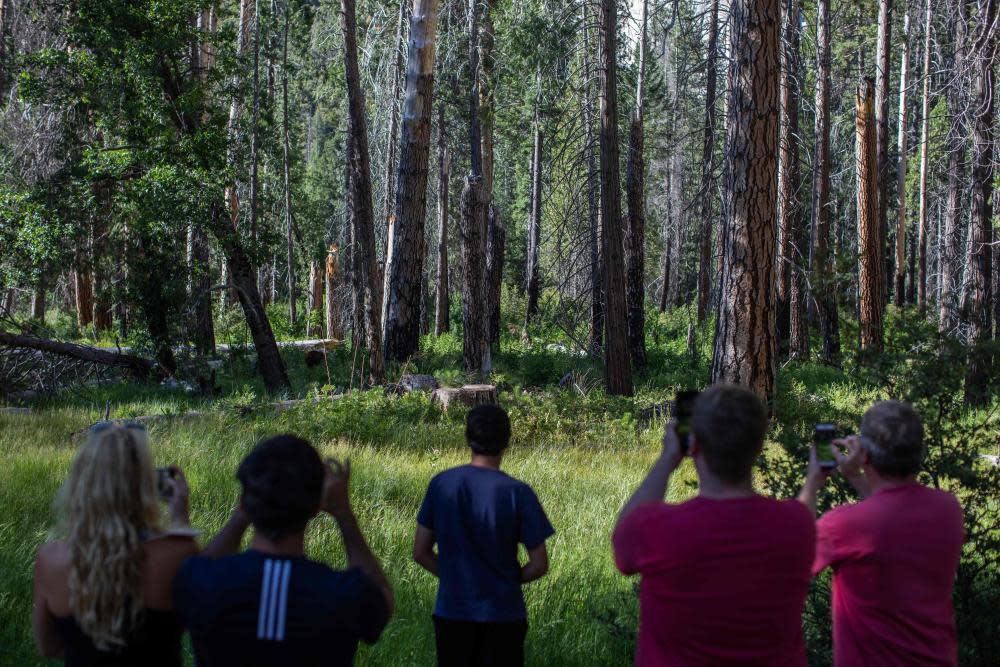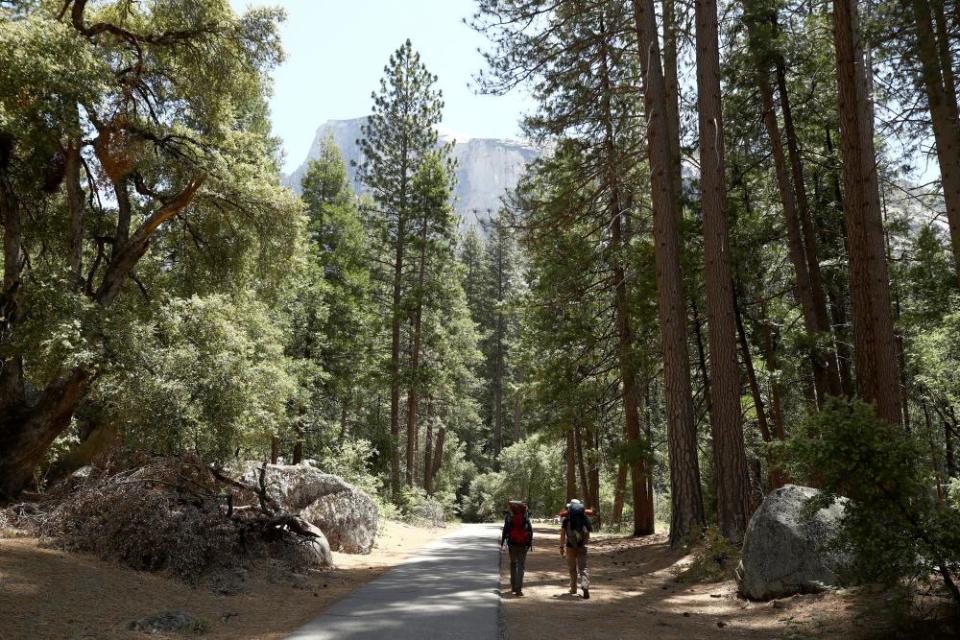'It's a race to get out there': stir-crazy Californians are overwhelming campsites

Chris Giesige thought planning a camping trip would be simple. He’s a regular, often heading out into the wilderness several times per year. But when he recently tried to reserve a campsite online in Yosemite, then Mammoth, then Whiskeytown Lake, he was shocked to see they were all booked for weeks. Twice he thought he’d found an open spot, only to see it get snapped up moments later.
“I know May, June and July are busy camping months, but I don’t remember it being like this,” he says. “I have never had as much trouble before in trying to find a campground.”
Camping has surged in popularity amid the coronavirus pandemic, as people ditch flights and hotels in favor of outdoor activities. In California, home to some of America’s most scenic regions and national parks, campgrounds are experiencing crowds like never before, with some areas seeing double or even triple the number of usual visitors.
“This year is more of a race to see who can get out there first,” says Giesige.
And while park administrators say they are happy to see new people experiencing the outdoors, some local residents are less than pleased with the crowds. Inexperienced campers have brought trash and unsafe behavior, while the surge in visitation has contributed to a lack of supplies in small towns.

Leslie Chapman, the assistant county administrative officer in Inyo county, located between the Sierra Nevada mountains and the state of Nevada, says the campgrounds in her area are packed, resulting in large numbers of people camping outside designated areas.
“Campers are leaving waste and starting fires in undesignated places. Our best analysis is that stir-crazy people who have never camped are trying it as a perceived safe means to get away,” she says. The county has started a public relations campaign to teach inexperienced people how to enjoy the wilderness and protect the environment at the same time.
In Lake Tahoe, one of the state’s most popular destinations, frustrated residents recently held protests to demand authorities do more to manage the deluge of visitors, which they say has led to heavy traffic, packed beaches and an uptick in garbage. Chants of “pack it in, pack it out”, rang through the streets at five demonstrations last week. Local resident Jessica Robinson told the Tahoe Daily Tribune: “It’s the most trash I’ve ever seen. I grew up here, and it’s out of hand.”
Giesige, who lives in Los Angeles, witnessed the crush of visitors in Lake Tahoe first-hand. He ended up there after his failed attempts to visit other spots, hastily reserving a campsite he saw was available for two nights. But when he arrived at the site, he soon found out why it was the only one available: it was about 15 feet from the major thoroughfare Highway 89.
The first day Giesige went by King’s Beach on the lake’s shore and found it completely packed. “Up and down the whole area the beach was covered,” he says. Later in the day, he tried to escape into the water, searching for a raft or tube rental to float the river – without any luck. He returned to the packed campsite, frustrated.
Joseph Flannery, a public affairs officer with Tahoe national forest, says the area is experiencing an unusually high demand for campgrounds. For the months of June and July, most of the campgrounds were 100% reserved during weekend periods and many were 100% reserved midweek.
Flannery says popular campgrounds such as Granite Flat have experienced a 207% increase in occupancy this year compared to 2019, while less popular campgrounds saw a 300-432% increase in occupancy.

Another indicator of increased visitation is the number of escaped campfires, eg fires outside of designated camping areas, Flannery says. Escaped campfires require suppression and can even become full-blown wildfires, stretching wildland firefighting resources to the limit.
Tahoe national forest employees found that the number of escaped fires in 2020 which required a firefighting response was more than 225% higher than the previous record, set in 2018.
Flannery adds that all national forests in California, are currently under campfire restrictions and that in California, about 95% of all wildfires are caused by humans.
Dyana Kelley, president of CampCalNow, an alliance of private campgrounds and RV parks, says the summer crowds have tripled the amount of work that a campground employee takes on – while being short on staff due to the pandemic.
“They’re cleaning up unsurmountable garbage, they’re being bouncers, closing parking lots, sanitizing and wiping things down,” she says, adding that these employees are often seasonal, unsalaried workers. “They didn’t sign up for that aspect of the job. They wanted to do nature walks because that’s what they’re passionate about.”

Kelley predicts that despite some of the challenges, the boom is ultimately a good thing that will introduce many many first-time campers to the joy of the outdoors. “With all the different types of camping available out there, like glamping and people are discovering that it’s so much fun,” she says. “I think people will find that being forced out of their comfort zone has really opened some new doors for adventure.”
Craig Sap, a district superintendent with the California State Parks, Angeles district, says that camping is often better managed than other California outdoor activities, like going to the beach. Campgrounds in his area, which includes Malibu, filled up consistently even before the pandemic. Now, the state park officials have capped the campgrounds at 70% capacity to leave space between campers.
“The beach is a free-for-all,” he says. “But we have the ability to manage and maintain capacity. We know how many people are going to be there and we know our resources – how much water, electricity, paper towels – they will need.”
Giesige had planned to backpack in Yosemite earlier this year, and wanted to reschedule the trip early this fall, but the crowds have been daunting. “We said screw it and we’re going to aim for the end of this year or early next year,” he said. “It’ll be interesting to see what happens next year or to those who brave camping during the winter.”

 Yahoo News
Yahoo News 
